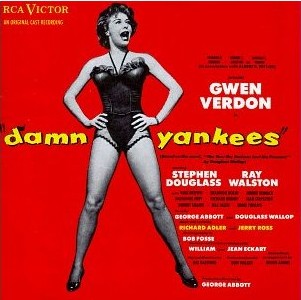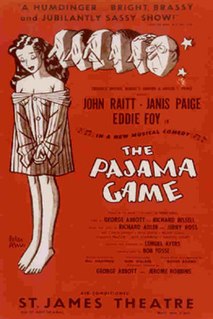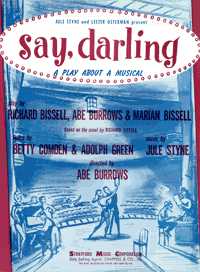
Henry Mancini was an American composer, conductor, arranger, pianist and flautist. Often cited as one of the greatest composers in the history of film, he won four Academy Awards, a Golden Globe, and twenty Grammy Awards, plus a posthumous Grammy Lifetime Achievement Award in 1995.

Ain't Misbehavin' is a musical revue with a book by Murray Horwitz and Richard Maltby Jr., and music by various composers and lyricists as arranged and orchestrated by Luther Henderson. It is named after the song by Fats Waller, "Ain't Misbehavin'".

Harold Smith Prince, commonly known as Hal Prince, was an American theatre director and producer known for his work in musical theatre.

Damn Yankees is a 1955 musical comedy with a book by George Abbott and Douglass Wallop, music and lyrics by Richard Adler and Jerry Ross. The story is a modern retelling of the Faust legend set during the 1950s in Washington, D.C., during a time when the New York Yankees dominated Major League Baseball. It is based on Wallop's 1954 novel The Year the Yankees Lost the Pennant.

The Pajama Game is a musical based on the 1953 novel 7½ Cents by Richard Bissell. The book is by George Abbott and Richard Bissell; the music and lyrics are by Richard Adler and Jerry Ross. The story deals with labor troubles in a pajama factory, where workers' demands for a seven-and-a-half cent raise are going unheeded. In the midst of this ordeal, love blossoms between Babe, the grievance committee head, and Sid, the new factory superintendent.
A cast recording is a recording of a stage musical that is intended to document the songs as they were performed in the show and experienced by the audience. An original cast recording or OCR, as the name implies, features the voices of the show's original cast. A cast recording featuring the first cast to perform a musical in a particular venue is known, for example, as an "original Broadway cast recording" (OBCR) or an "original London cast recording" (OLCR).

Salad Days is a musical with music by Julian Slade and lyrics by Dorothy Reynolds and Julian Slade. The musical was initially performed in 1954 in the UK in Bristol and then in the West End, where it ran for 2,283 performances.

Robert Alan Morse was an American actor, who starred in How to Succeed in Business Without Really Trying, both the 1961 original Broadway production, for which he won a Tony Award, and its 1967 film adaptation; and as Bertram Cooper in the critically acclaimed AMC dramatic series Mad Men (2007–2015). He won his second Tony Award for playing Truman Capote in the 1989 production of the one-man play Tru. He reprised his role of Capote in an airing of the play for American Playhouse in 1992, winning him a Primetime Emmy Award.

Urban Clifford "Urbie" Green was an American jazz trombonist who toured with Woody Herman, Gene Krupa, Jan Savitt, and Frankie Carle. He played on over 250 recordings and released more than two dozen albums as a soloist. He was inducted into the Alabama Jazz Hall of Fame in 1995.
J.B. is a 1958 play written in free verse by American playwright and poet Archibald MacLeish, and is a modern retelling of the story of the biblical figure Job – hence the title: J.B./Job. The play went through several incarnations before it was finally published. MacLeish began the work in 1953 as a one-act production, but within three years, had expanded it to a full, three-act manuscript.
Matt Mattox was an American jazz and ballet dancer. He was a Broadway performer and a specialty dancer in many Hollywood musicals. His best-known film role was as Caleb Pontipee in the 1954 film Seven Brides for Seven Brothers.

Richard Pike Bissell was an American author of short stories and novels. His third book, and second novel, 7½ Cents, was adapted into the Broadway musical The Pajama Game. This won him the 1955 Tony Award for Best Musical. He wrote a book about the experience called Say, Darling, which chronicled the ins and outs of a Broadway musical production and featured characters based on those he worked with; this book was also turned into a musical, also called Say, Darling, in 1958.

Take Me Along is a 1959 musical based on the 1933 Eugene O'Neill play Ah, Wilderness, with music and lyrics by Bob Merrill and book by Joseph Stein and Robert Russell.

Jamaica is a musical with a book by Yip Harburg and Fred Saidy, lyrics by Harburg, and music by Harold Arlen. It is set on a small island off the coast of Jamaica, and tells about a simple island community fighting to avoid being overrun by American commercialism.

Pat Suzuki is an American popular singer and actress, who is best known for her role in the original Broadway production of the musical Flower Drum Song, and her performance of the song "I Enjoy Being a Girl" in the show.

Jennie is a musical with a book by Arnold Schulman, music by Arthur Schwartz, and lyrics by Howard Dietz, and starred Mary Martin.

Liliane Montevecchi was a French-Italian actress, dancer, and singer.
David Anthony Stuart Atkinson was a Canadian baritone and New York Broadway actor/singer. Most of his career was spent performing in musicals and operettas in New York City from the late 1940s through the early 1970s, although he did appear in some operas and made a few television appearances. In 1952 he created the role of Sam in the world premiere of Leonard Bernstein's Trouble in Tahiti. From 1956-1962 he was a leading performer at the New York City Opera where he starred in several musicals and appeared in the world premieres of several English language operas. His greatest success on the stage came late in his career: the role of Cervantes in Man of La Mancha which he portrayed in the original Broadway production, the 1968 national tour, and in the 1972 Broadway revival.

Virginia Martin was an American actress and singer known for her work on the Broadway stage and on television. She was nominated for the Tony Award for Best Featured Actress in a Musical in 1963.
Jack Waldron was an American actor-comedian, singer and dancer.















